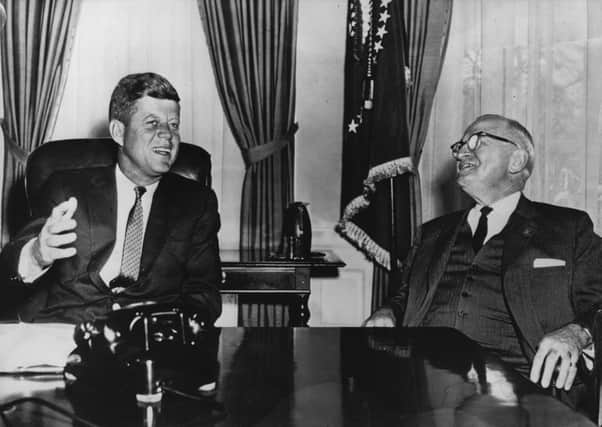President Kennedy’s dream - Together to the moon (1963)


He said such co-operation might stem from reduction of tensions and the “further agreements” now possible between East and West in the wake of the nuclear test ban treaty.
If Russia and American were to be fully secure they needed “a much better weapon” than the hydrogen bomb, ballistic missiles or nuclear submarines. This “weapon” was peaceful co-operation.
Advertisement
Advertisement
President Kennedy called for “further joint efforts in the regulation and exploration of space”.
He said: “I include among these possibilities a joint expedition to the moon.”
Noting the present “immense duplication” of space research, he said that surely America and Russia “in this decade” could work together to send a joint team to the moon as “representatives of all humanity”.
Reflecting the mood of optimism at the 18th Assembly session, the US President said there was an opportunity to stretch the present “pause in the Cold War” into a period of fruitful co-operation.
Advertisement
Advertisement
He appealed to all nations to set aside “the narrow pursuit of self-interest” and seek peaceful solutions of their regional problems.
“Even little wars are dangerous in a nuclear world,” President Kennedy warned.
In his prepared text, the US President did not refer to the Soviet proposal for a summit conference of the big four nations and their partners in the 18 member UN Disarmament Committee.
But he endorsed the appeal by the Soviet Foreign Minister Mr Andrei Gromyko, for an international ban on the use of nuclear weapons in outer space.
Advertisement
Advertisement
Detailing the areas in which America – “in full consultation with our allies” – might reach agreement with Russia, President Kennedy cited measures to prevent accidental war, safeguards against surprise attack, curbs on the nuclear arms race, prevention of the further spread of nuclear weapons, the conversion of fissionable materials to peaceful purposes, and a ban on underground nuclear testing “with adequate inspection and enforcement”.